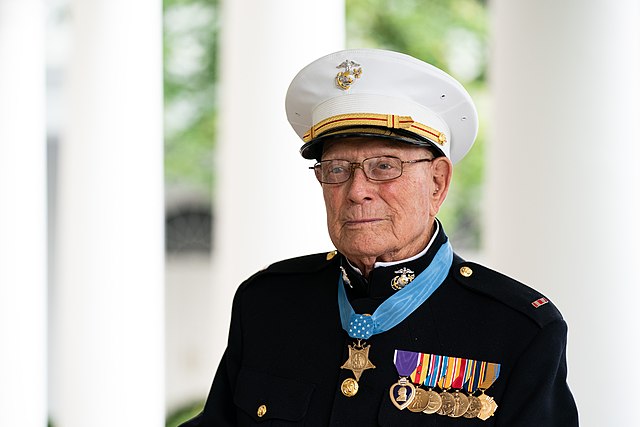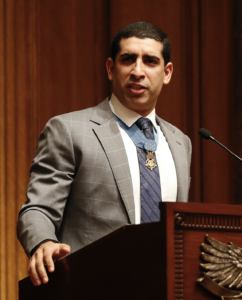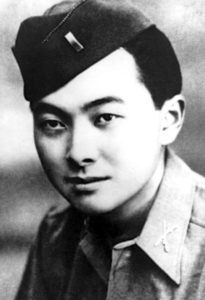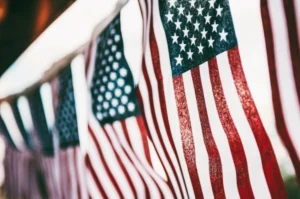The National Medal of Honor Museum Foundation mourns the passing of Hershel “Woody” Williams, who passed away on June 29, 2022, at the age of ninety-eight. Woody was the last surviving Medal of Honor recipient from World War II. More than that, he was a loving family man of profound honor and integrity who devoted much of his life after World War II to supporting American veterans and their families. He lived always by the finest standards of the United States Marine Corps.
Woody Williams was born on October 2, 1923, on a dairy farm in Quiet Dell, West Virginia. He was the youngest of eleven children, six of whom passed away before reaching adulthood. As a young man, he worked as a truck driver for the W.S. Harr construction company in Fairmont, and as a taxi driver along with other odd jobs. He also worked for the Civilian Conservation Corps, and was in Montana on a CCC project when the Japanese attacked Pearl Harbor on December 7, 1941.
Woody’s patriotic family immediately thought of how they could serve their country. Two of his brothers joined the U.S. Army. But Army service wasn’t for Woody. “They were wearing that brown ugly Army uniform,” he remembered. “I didn’t want to be caught dead in that thing.” Once a year, two Marines from Woody’s small West Virginia community had returned home on furlough, and he admired their dress blue uniforms. This admiration, coupled with his deep seeded patriotism, inspired Williams to attempt to join the Marine Corps. Woody was only 5’6”, however, and so the Marines rejected his first attempt to enlist. Not until 1943, when the service’s height requirement was reduced, was he accepted.
Woody later admitted he was a bit naive about the military and thought that he would be staying in the US, daring any enemy to try and take the American people’s freedom. Instead, Williams was sent to the South Pacific. “I didn’t even know we had a South Pacific,” he quipped.
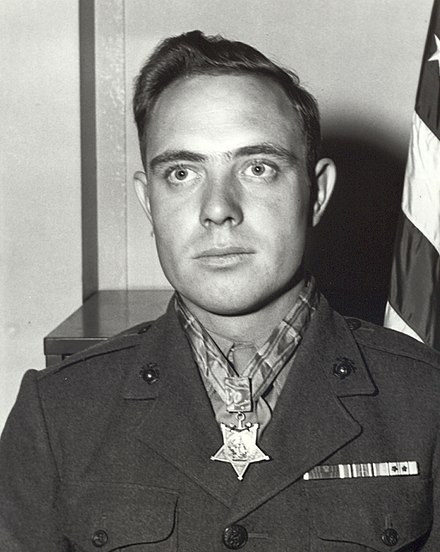
Assigned initially to the 32nd Replacement Battalion, Williams was a part of a group known as the “Hollywood Marines.” These men completed their training in San Diego, California rather than the typical Parris Island, South Carolina. Sent to Guadalcanal, which U.S. forces had captured early in 1943, he was trained as a flamethrower operator and demolition man. In July 1944 he saw action during the battle for the island of Guam.
In February of 1945 Williams was a part of the 21st Marine Regiment, 3d Marine Division. As a part of the reserve division, he was originally under the impression that the battle would not last more than three days, and his unit would not be used. “They told us that probably we would never get off the ship,” he recalled.
Unbeknownst to the US, there were 21,000 Japanese soldiers entrenched on Iwo Jima, and their ferocious resistance quickly forced the Marines to deploy all available assets. After the first day of battle on February 19, Woody’s unit was designated to go ashore. The Marines onshore had not been able to move inland enough for the next division to move in, however, and so Williams and his fellow Marines had to return to their ships after spending a whole day on their landing craft, miserably seasick. They were able to land the next day. Williams would fight for 34 of the 36 days of the Battle of Iwo Jima.
On February 23, 1945, five days into the battle, Williams was the only surviving Marine in his six-man demolition team, all the others having been killed or wounded. His division faced networks of mutually supporting Japanese pillboxes, reinforced with concrete and extremely hard to eliminate. Hindered by the black volcanic sand, American tanks were unable to destroy them. Desperate to break through, Woody’s company commander asked if he could use his flamethrower to knock out some of the pillboxes. “I’ll try,” Woody replied.
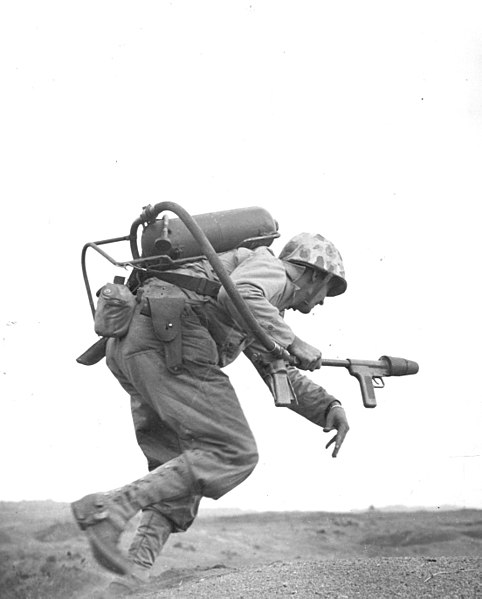
Williams later stated that he could never explain how, over the following four hours, he eliminated seven pillboxes with six different flamethrowers. Covered only by four Marine riflemen, Woody braved enemy fire again and again to prepare and employ his flamethrowers and demolition charges to devastating effect. Once, he jumped onto one of the pillboxes from the side and, shoving the nozzle of his seventy-pound flamethrower into an air vent pipe, incinerated everyone inside. Another time, he charged several bayonet-wielding Japanese soldiers and killed them with one burst of flame.
Afterwards, Woody continued in action and would eventually receive a Purple Heart for wounds sustained during the fighting. After the fighting on Iwo Jima concluded toward the end of March, he was redeployed to Guam, where he trained for an invasion of Japan that never took place. He returned to the United States on a flight that included badly emaciated former prisoners of war. Despite their sufferings, Williams remembered that “they were the happiest group I’ve ever seen because they were on their way home from unknown torture.” Landing in San Francisco, Williams took a cross-country train to West Virginia, where he arrived unannounced to the surprise and delight of his family and fiancée.
On October 5, 1945, Corporal Williams received the Medal of Honor at the White House from President Harry Truman for his gallant actions at the Battle of Iwo Jima. Twelve days later he married his wife Ruby. The couple had two daughters and were together for 63 years until Ruby passed in 2007.
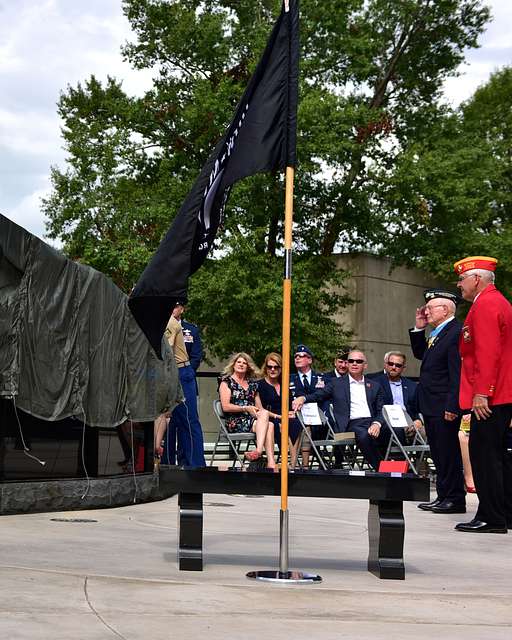
Memories of the war stayed with Williams. He experienced what is now recognized as Post Traumatic Stress, and felt immense guilt for fellow Marines who didn’t make it home. He believed that the recognition that the Medal of Honor brought him was one of the best therapies he could have received. The public eye prevented him from withdrawing and forced him to discuss Iwo Jima and his combat experiences. Although he wasn’t very religious prior to the war, and accidentally declared himself Catholic on his enlistment papers, upon returning home Williams found solace in the Methodist Church. His devotion to God, his country, and his family guided Williams through his life after the war.
Woody Williams served a total of twenty years in the Marine Corps and Marine Corps Reserve. His love for country and comrades continued long after World War II ended as he committed himself to serving his fellow servicemen. Woody worked for 33 years as a Veterans Service Representative with the Department of Veterans Affairs and for nearly 10 years as the Commandant of the Veterans Nursing Home in Barboursville, West Virginia. He also served as the Chaplain for the Congressional Medal of Honor Society for 35 years.
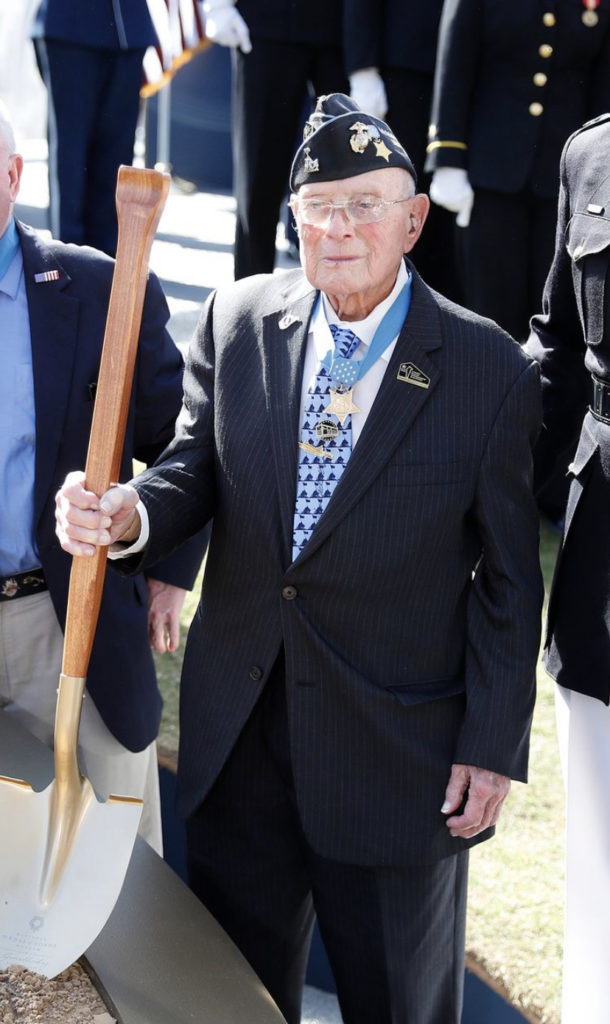
Perhaps his largest impact, however, has come from The Woody Williams Foundation. The nonprofit group honors and supports Gold Star Families whose loved ones have made the ultimate sacrifice. The foundation was inspired by his early experience as a cab driver delivering Western Union telegrams informing family members of the loss of their loved ones and witnessing his fellow soldiers give their lives in World War II.
“Everybody has some instinct of bravery,” Woody Williams once said. “And, as long as they can control the fear, you can be brave. But if fear overtakes you and becomes the dominant instinct, you cannot operate. You cannot operate under fear. Your brain won’t let you. I feel that our upbringing had some influence on our bravery because we were taught in the Depression years, if you didn’t have it, you had to make it. And the only way you could make it was to work at it. Our upbringing gave us the confidence that developed into bravery.”
Woody’s shining example of bravery, love, and commitment will always inspire the National Medal of Honor Museum Foundation, the United States Marine Corps, veterans, and the United States of America.
